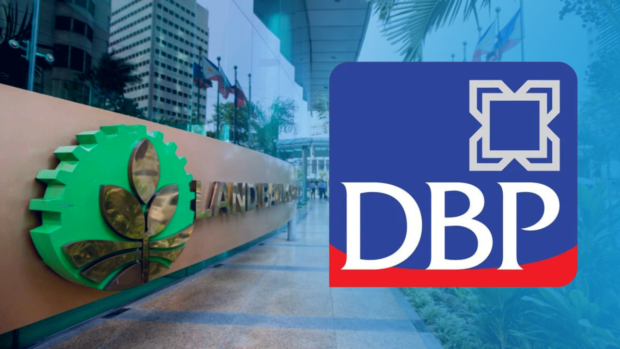Malacañang in no rush to implement the much debated Landbank-DBP union

Landbank and DBP/ INQUIRER FILES
MANILA -The planned merger of Land Bank of the Philippines and Development Bank of the Philippines may be facing more hurdles than anticipated as Malacañang asked the overseer of state-run firms to study the proposal some more.
In a memorandum dated July 26, Executive Secretary Lucas Bersamin said the Office of the President (OP) was deferring action on a request of the Governance Commission for Government-owned and Controlled Corporations (GCG) for the issuance of an executive order that approves the Landbank-DBP merger, with Landbank as the surviving entity.
“Upon evaluation, taking into consideration the comments and recommendations of the (Department of Finance, Landbank, DBP, Bangko Sentral ng Pilipinas (BSP), Philippine Competition Commission), and Commission on Audit, you are hereby directed to conduct further study of the proposed merger,” Bersamin said in the letter addressed to GCG Chair Alex Quiroz.
Malacañang directive
Also, the GCG was instructed to submit to the OP findings and recommendations on matters that include “further legal and factual bases for the approval” of the merger as well as “a comprehensive study of the timeliness of the proposed merger.”
Further, the GCG is expected to turn in information about the financial impact of the merger on the balance sheet of Landbank in the context of the capital and liquidity requirements of the BSP and — to meet such BSP requirements — the capital infusion that may be needed from the national government.
By the reckoning of Finance Secretary Benjamin Diokno, who is the main champion of the merger and also serves as ex-officio member of GCG, the creation of the Philippines’ new largest bank would happen within this year.
Impact on employees
GCG is also directed to explain the basis of and cost for the grant of “merger incentive pay and separation incentive pay” to affected DBP employees, as well as the number of employees affected. In addition, the GCG is required to submit an action plan to address the various issues and concerns raised by government agencies concerned, and to present favorable recommendations of government agencies that may agree with the planned merger.
“Pending the submission of (these) requirements, we are respectfully returning your request (for EO that approves the merger) without action,” Bersamin said.
Last April, the GCG clarified that there was no decision yet that approved the merger after saying that the proposal does not require any new law from Congress, and that this may be done through an act of the President.
In February 2016, then President Benigno Aquino III issued EO 198 that provided for the merger, with Landbank as the surviving entity. Seven months later in September, then Finance Secretary Carlos Dominguez III said GCG had abandoned the planned merger by way of an en banc resolution.
Dominguez and Diokno, who was then budget secretary, also signed the resolution as ex-officio members of GCG. In completely opposite words to those of the present GCG, Dominguez said the merger was scuttled because the two banks have different purposes and that such a union cannot be done without a law passed by Congress.
